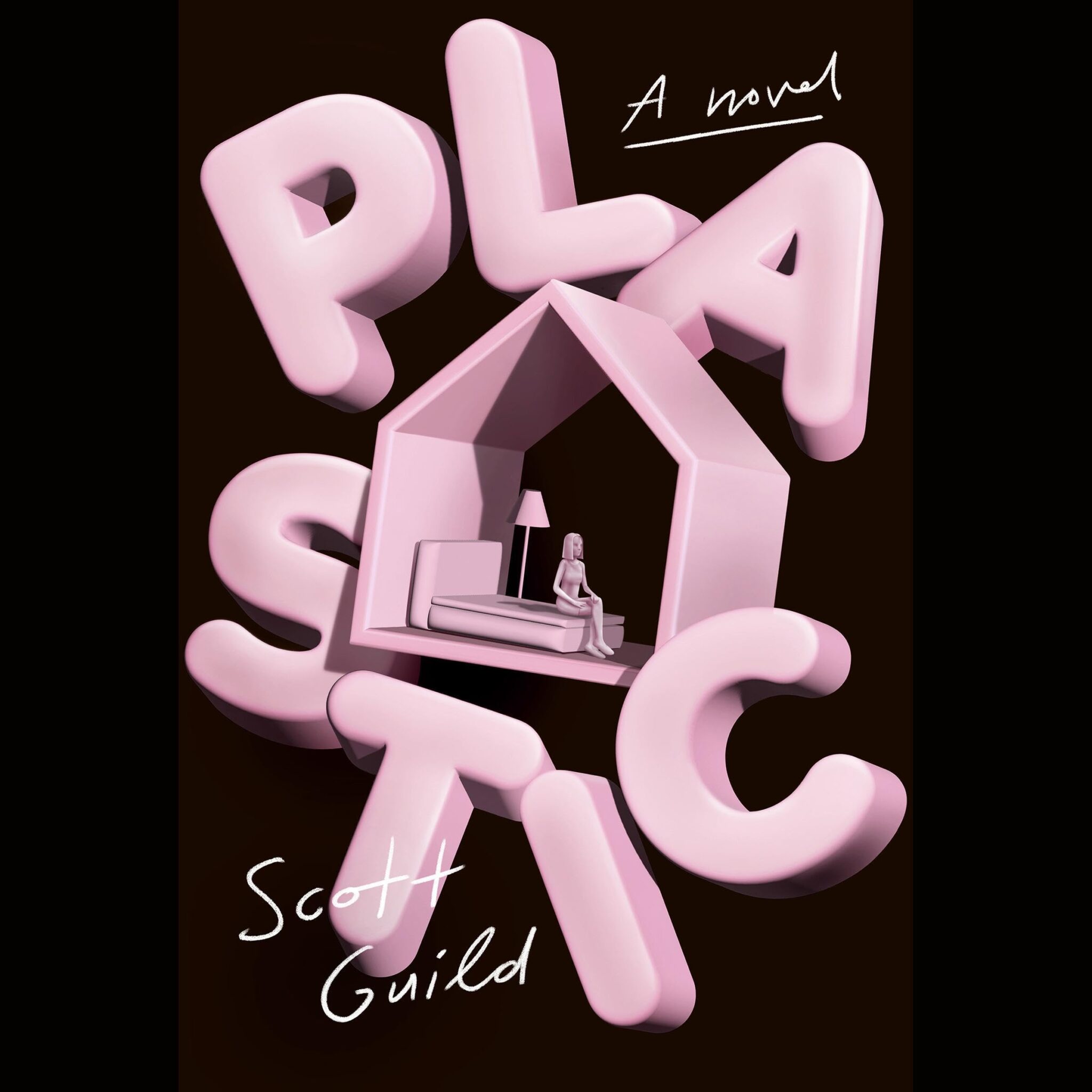Erin is a plastic girl living in a plastic world. Every day she eats a breakfast of boiled chicken, then conveys her articulated body to Tablet Town, where she sells other figurines Smartbodies: wearable tech that allows full, physical immersion in a virtual world, a refuge from real life’s brutal wars, oppressive governmental monitoring, and omnipresent eco-terrorist insurgency. If you cut her, she will not bleed—but she and her fellow figurines can still be cracked or blown apart by gunfire or bombs, or crumble away from nuclear fallout. Erin, who’s lost her father, sister, and the love of her life, certainly knows plenty about death.
Both a crypto-comedic dystopian fantasy and a deadly serious dissection of our own farcical pre-apocalypse, Scott Guild’s debut novel is an achingly beautiful, disarmingly welcoming, and fabulously inventive look at the hollow core of modern American society—and a guide to how we might reanimate all its broken plastic pieces.
Reading that, you may think you know what the book is going to be about. But you don’t. This book is not what it claims to be. Like a bad episode of Black Mirror, it cares more about aesthetics than substance. And the aesthetics don’t make up for what lurks underneath.
Erin is plastic. She’s actually plastic. I kept waiting for a fourth wall to break, to show that she maybe was not, in actuality, a plastic person. But she is, and so is everyone else. But they weren’t always. Because this book takes place on our planet, in our future. We have flashbacks that show Erin as a flesh and blood human. She skins her knee and she bleeds. But then suddenly she, and everyone else, is plastic, and it is not explained or addressed.

This isn’t a stylistic choice, because other oddities are addressed. The most egregious being the way the characters speak. Their English cannot even be likened to internet vernacular or mannerisms. It’s just… broken and infantilized. Apparently, we decide this is a better way to speak in the future. It’s supposedly quicker, more efficient. It’s also a great way to work in cheeky names for climate change and fossil fuels. HeatLeap and Ground-Up-Bone fit right in with “wow wow”, “blummo”, and “qunky”.
Another point against the description: Erin does not lose the love of her life. She watches someone die and decides he was her soul mate. She obsesses over him to the point that she uses his likeness as an AI companion. She exploits the memories of his grieving loved ones to legitimize her fantasy. And when she can’t handle the lies anymore she kills the AI. Violently. I am a fan of unsympathetic characters but Erin isn’t framed as one. The reader is constantly asked to feel sorry for Erin, sometimes through song.
Yes, through song. This is a book with musical numbers. Both in the story and in the substory within a story. If you want to listen to them, there is an album releasing alongside the book. At least one of these songs is word for word one that Erin sings. Half of this book is treated like an episode of a tv show that isn’t happening. It’s just how Erin sees her life. But that substory within a story? That is a TV show Erin watches, except it’s also her fanfiction of that story based on her dad’s past. If you’re confused, Erin shows up in an episode that she’s watching, so, you’re right to be.
The main crux of my issue lies in this other TV show. It is an absurd take on the fallout of a nuclear war. And I do mean absurd as the genre—there are waffles, robots, and fur cubes in addition to plastic people. The waffles and robots speak normally and seem to occupy the same space as humans. The president is a waffle. But the fur cubes speak nonsense and fly around… while also holding down jobs and operating as humans in society. Absurdism is fine, it has its place. But here, it really lacks purpose.
I mentioned the president is a waffle. This is the president who starts the nuclear war. The love interest of the show is also a waffle. He experiences all manner of prejudice and assumptions because of his bread. If you wanted to read “skin” or “race” or “religion” etc in the place of bread, so did I. It seems like the natural conclusion of that description. Here’s where it falls apart.
This book ends in an overtly Christian cemetery. The author takes great pains to detail the different headstones. There are Virgin Marys, saints, angels, Christs… and that’s it. Millions of people—this is a mass grave—and all are good Christians awaiting the rapture. Erin spends the last few pages in constant prayer. People find God on their deathbed. Faith and peace is discussed at length as the answer to nuclear war and terrorism.
So we have a book with terror groups, with labor camps, with “Suspect Status”. A book about the fate of our world as whole in a future ravaged by climate change and war. And this book’s answer is a very specific religious group. People are dying due to beliefs like the one this book holds. This is not inventive, it is not welcoming, it is not beautiful. This is a book about a future while ignoring our global present. And it’s marketed as a fun time with sing-a-longs.
If you do want to see for yourself, Plastic by Scott Guild comes out on February 13th, 2023 from Pantheon.
Image and description courtesy of Pantheon.
Have strong thoughts about this piece you need to share? Or maybe there’s something else on your mind you’re wanting to talk about with fellow Fandomentals? Head on over to our Community server to join in the conversation!

